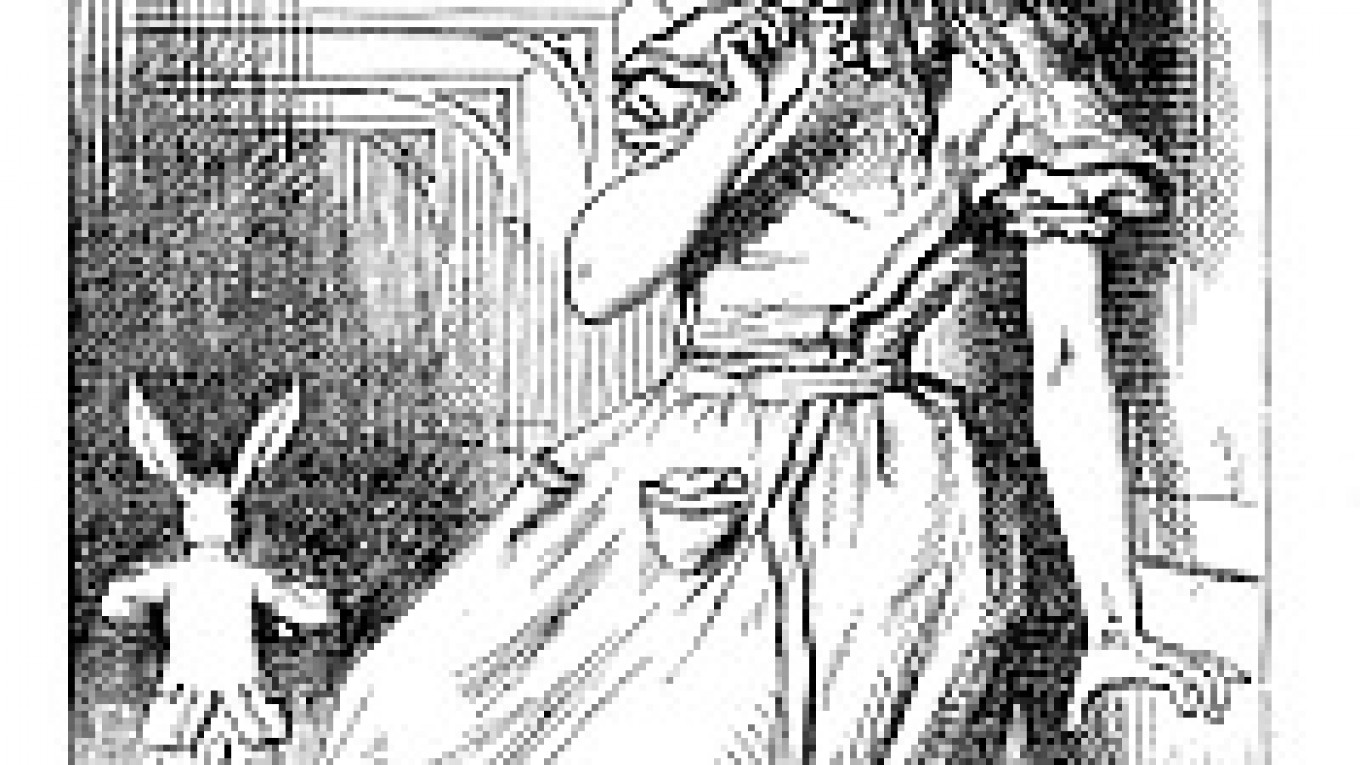But few people know the story of how "Alice" appeared in Russia -- a fantastic tale with several twists and turns that are almost as absurd as the book itself.
"Alice" first came out in Russian nearly 130 years ago, but back then, it seemed the book would not fare well here. The anonymously translated version of 1879 was met with confusion and bewilderment. "Tiring, most boring, most confused sick delusions of a little girl"; "absurd dreams may be recounted in a family circle for fun, but they are not published, illustrated and presented to the general public"; "one can hardly imagine anything less sensible and more absurd than this fairy tale; all mothers are urged to disregard this worthless fantasy" -- such was the critical consensus in Russia at the time.
The absurd world of Lewis Carroll, which immediately fascinated readers in Britain, was quite alien to readers elsewhere. Moreover, children's literature in Russia at the time tended to be extremely moralistic and plot-based, and Carroll's wild imagination did not fit in. As time went by, several new translations of "Alice" appeared; one of them (frankly, a bad one) was done by the young Vladimir Nabokov. But for almost a century, "Alice" was not a household name to Russians, even though translators tried their best to replace obscure English hints and poetic phrasings with more accessible Russian ones.
By the late 1960s, the background for a Carroll revival was ripe. There had been plenty of children's poetry written in the nonsense manner (or translated into Russian from other languages) so the genre was no longer shocking to readers. Furthermore, Soviet life itself was increasingly absurd -- and though absurdism was not officially encouraged in literature for adults, readers had softened to it.
That was when a strange, completely Carrollian thing happened.
An official responsible for non-Soviet socialist literature was leafing through the list of books recently published in the countries of the "people's democracy," as the Eastern European satellite states were called back then, when he stumbled upon the Bulgarian publication of a book about a girl called Alice. Thinking it was a Bulgarian book, he ordered a Russian translation to be done and published in Sofia for future importing into the Soviet Union (this was a standard procedure for such publications, which were sponsored by Soviet money). The Bulgarians were surprised, and it took some effort and persuading to find someone to translate the book from English and not from Bulgarian.
That translator happened to be Nina Demurova, a university instructor of English and translation who had long been fascinated by Carroll. Thus, the first postwar Russian version of "Alice" appeared in 1967 in Sofia, with illustrations by Bulgarian artist Petar Chuklev; Nina Demurova translated the bulk of the text, while the poems were flamboyantly translated by Dina Orlovskaya. It turned out that Demurova, a relative unknown at the time, had unwittingly outmaneuvered several famous translators who were fighting for the right to translate "Alice" at prestigious children's publishing houses in Moscow. (There's also a persistent urban legend that Demurova is actually Bulgarian.)
"I am very grateful to the director of the Bulgarian publishing house, Angel Stoyanov -- that was an unforgettable name -- for finding a way to circumvent the obtuse Soviet system," Demurova said in a recent interview at her Moscow apartment. "It was he who consulted his Soviet colleagues and finally suggested that I translate the book. After the publication, I had to collect my fee at the central bank in Sofia, and the director could not understand why I was getting Bulgarian levs for translating an English book into Russian. He was shocked I didn't speak any Bulgarian."
 Igor Tabakov / MT Nina Demurova, pictured in her Moscow apartment, did a 1967 translation of "Alice" that became wildly popular in the Soviet Union. | |
Several years after the Bulgarian publication, Demurova reworked her translation for the prestigious Literary Landmarks (Literaturniye Pamyatniki) series. Since this was an academic publication, her text required significant changes; the translation became even closer to the original, and the poems were translated anew by Olga Sedakova, who is now one of Russia's most famous poets. The book also included an extensive commentary by the U.S. science writer and Carroll buff Martin Gardner.
"I regret that the Sofia edition only came out once," Demurova said. "The older translation was intended for children. The new one was more academic, though we did our best to keep it readable and accessible. I don't think either of them is 'better' than the other -- it's just that their goals were somewhat different."
Since the Literary Landmarks edition, four new translations of "Alice" have appeared in Russian. The most readable among them is the one by Boris Zakhoder, a well-known children's author and translator whose renderings of "Winnie-the-Pooh" and "Mary Poppins" made these books instant classics in Russian families. His version of "Alice" is also admired by many, but it doesn't give credit to the weird and uncanny in Carroll's books.
Demurova's translation was used for two significant Soviet tributes to Carroll. One of these was a vinyl double-disk recording of "Alice's Adventure in Wonderland" performed by top Soviet actors in 1974. The moving force of that enterprise was the cult actor, singer and songwriter Vladimir Vysotsky, who wrote all the songs and performed a couple of the parts. Vysotsky was frowned upon by officials, so some brave and drastic steps had to be taken to save the record from prohibition. For example, the poet Bella Akhmadulina gave an interview to the influential weekly Literaturnaya Gazeta in which she congratulated readers on the New Year and promised them a wonderful present in the form of a new, musical fairy tale. After that, it became much harder for censors to pull the plug. The lines from Vysotsky's version still form the regular stock of quotes for people of my generation.
The second masterpiece was created in 1981-82 at the Kievnauchfilm movie studio. Animator Efrem Pruzhansky made a pair of cartoons based on "Alice's Adventures in Wonderland" and its sequel "Through the Looking-Glass." A far cry from the syrupy Disney version, these cartoons portray Wonderland as darkish, strange, absurd and sentimental -- in other words, very close to Carroll's original.
"Alice" had other echoes in Soviet pop culture. In the 1980s, the fantasy writer Kir Bulychyov wrote a series of extremely popular science-fiction books geared toward children that featured a girl named Alisa Seleznyova (these later became a television movie and a popular cartoon called "The Mystery of the Third Planet"). It is very likely that the name of Bulychov's heroine alluded to Carroll's Alice, who also confronts numerous mysteries in strange worlds.
Demurova has her own theories about why Carroll became so popular among Soviet and Russian readers.
"There's one important point about Carroll's books," she said. "Traditional fairy tales of that era -- be they British, German or Russian -- were rather fearsome, and the children in them were often afraid. 'Alice' is different; there's no fear in it. I think that's very important."
So perhaps the lack of fear was one reason behind Carroll's popularity in the Soviet Union: For people stuck in a gray reality, Alice's rabbit hole and looking-glass offered a way out.
A Message from The Moscow Times:
Dear readers,
We are facing unprecedented challenges. Russia's Prosecutor General's Office has designated The Moscow Times as an "undesirable" organization, criminalizing our work and putting our staff at risk of prosecution. This follows our earlier unjust labeling as a "foreign agent."
These actions are direct attempts to silence independent journalism in Russia. The authorities claim our work "discredits the decisions of the Russian leadership." We see things differently: we strive to provide accurate, unbiased reporting on Russia.
We, the journalists of The Moscow Times, refuse to be silenced. But to continue our work, we need your help.
Your support, no matter how small, makes a world of difference. If you can, please support us monthly starting from just $2. It's quick to set up, and every contribution makes a significant impact.
By supporting The Moscow Times, you're defending open, independent journalism in the face of repression. Thank you for standing with us.
Remind me later.


